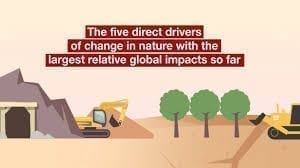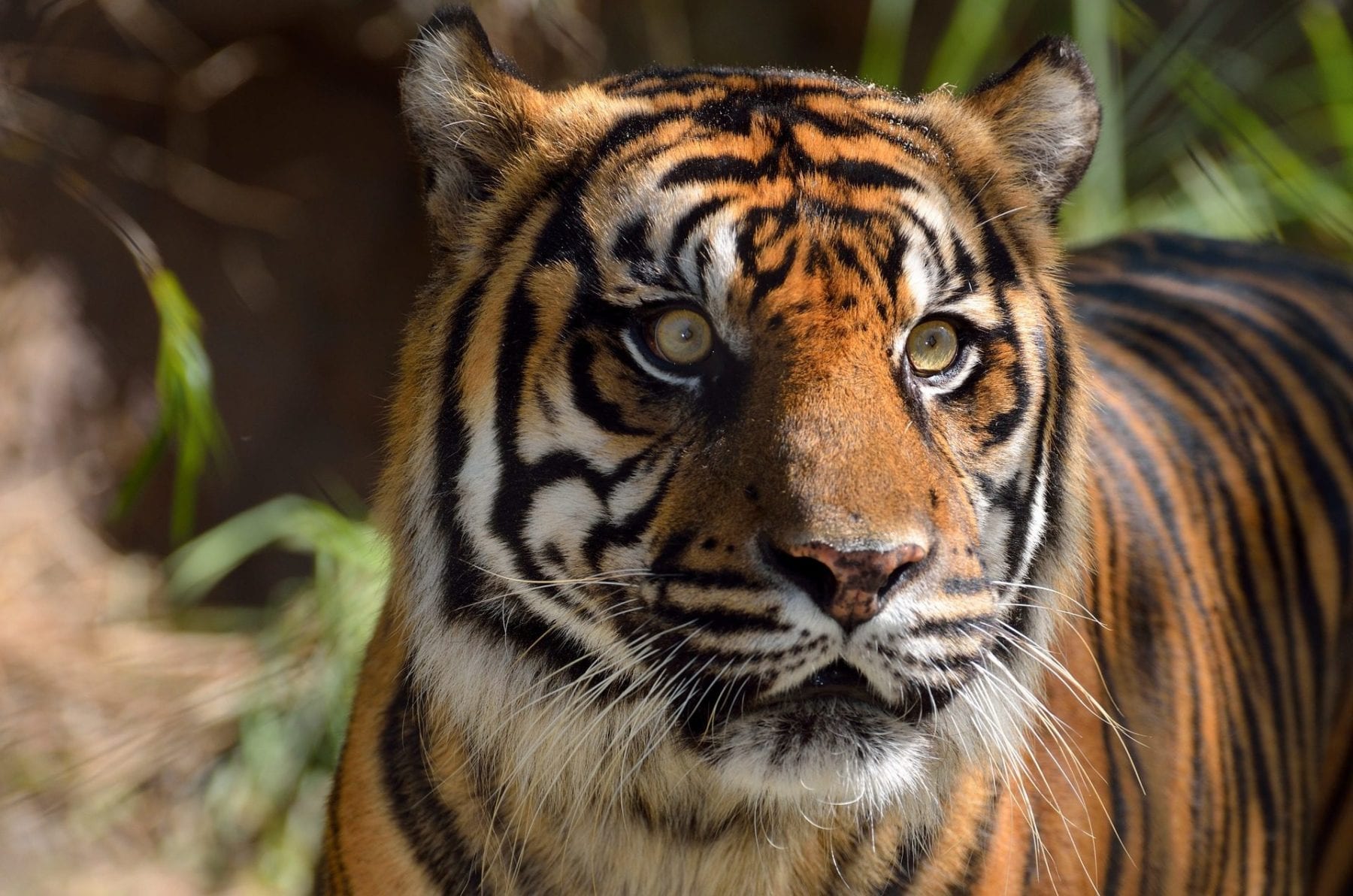
The accelerating disappearance of Earth’s species of both wild and domesticated plants and animals constitutes a fundamental threat to the well-being and even the survival of humankind
The accelerating disappearance of Earth’s species of both wild and domesticated plants and animals constitutes a fundamental threat to the well-being and even the survival of humankind, warns the founding Chair of a new global organization created to narrow the gulf between leading international biodiversity scientists and national policy-makers.
In Norway to address an elite gathering of 450 international officials with government responsibilities in the fields of biodiversity and economic planning, Zakri Abdul Hamid offered his first public remarks since being elected in January to head the new Intergovernmental Science-Policy Platform on Biodiversity and Ecosystem Services (IPBES) — an independent body modeled on the Intergovernmental Panel on Climate Change.
Dr. Zakri, a national of Malaysia who co-chaired 2005’s landmark Millennium Ecosystem Assessment and serves also as science advisor to his country’s prime minister, cited fast-growing evidence that “we are hurtling towards irreversible environmental tipping points that, once passed, would reduce the ability of ecosystems to provide essential goods and services to humankind.”
The incremental loss of Amazon rainforest, for example, “may seem small with shortsighted perspective” but will eventually “accumulate to cause a larger, more important change,” he said. Experts warn that ongoing climate change, combined with land use change and fires, “could cause much of the Amazon forest to transform abruptly to more open, dry-adapted ecosystems, threatening the region’s enormous biodiversity and priceless services,” he added.
“It has been clear for some time that a credible, permanent IPCC-like science policy platform for biodiversity and ecosystem services is an important but missing element in the international response to the biodiversity crisis,” Dr. Zakri told the 7th Trondheim Conference on Biodiversity.
The Millennium Ecosystem Assessment “demonstrated that such an intergovernmental platform can create a clear, valuable policy-relevant consensus from a wide range of information sources about the state, trends and outlooks of human-environment interactions, with focus on the impacts of ecosystem change on human well-being. It showed that such a platform can support decision-makers in the translation of knowledge into policy.
“The Millennium Ecosystem Assessment provides our baseline,” he said. “The IPBES will tell us how much we have achieved, where we are on track, where we are not, why, and options for moving forward. It will help to build public support and identify priorities.”
The structure of IPBES mimics that of the IPCC but its aims go further to include capacity building to help bridge different knowledge systems.
“IPBES will reduce the gulf between the wealth of scientific knowledge on declining natural world conditions, and knowledge about effective action to reverse these damaging trends,” he said.
Even barnyard diversity is in decline
Some scientists have termed this the “sixth great extinction episode” in Earth’s history, according to Dr. Zakri, noting that the loss of biodiversity is happening faster and everywhere, even among farm animals.
He underlined findings by the UN Food and Agriculture Organization that genetic diversity among livestock is declining.
“The good news is the rate of decline is dropping but the latest data classify 22% of domesticated breeds at risk of extinction,” Dr. Zakri said.
Breeds become rare because their characteristics either don’t suit contemporary demand or because differences in their qualities have not been recognised. When a breed population falls to about 1,000 animals, it is considered rare and endangered.
Causes of genetic erosion in domestic animals are the lack of appreciation of the value of indigenous breeds and their importance in niche adaptation, incentives to introduce exotic and more uniform breeds from industrialised countries, and product-focused selection.
Among crops, meanwhile, about 75 per cent of genetic diversity was lost in the last century as farmers worldwide switched to genetically uniform, high-yielding varieties and abandoned multiple local varieties. There are 30,000 edible plant species but only 30 crops account for 95% of human food energy, the bulk of which (60%) comes down to rice, wheat, maize, millet and sorghum.
“The decline in the diversity of crops and animals is occurring in tandem with the need to sharply increase world food production and as a changing environment makes it more important than ever to have a large genetic pool to enable organisms to withstand and adapt to new conditions,” he said.
The Latest Bing News on:
Farm animal diversity
- Lawsuit seeks endangered species protection for rare East Tennessee salamanderon May 9, 2024 at 2:09 pm
The Center for Biological Diversity has filed suit against the U.S. Fish and Wildlife Service over its refusal to grant a rare southern salamander Endangered Species Act protections.
- No bull: Students organize saleon May 9, 2024 at 12:16 am
University of Nebraska students learn livestock marketing by hosting their own bull sale. Turning the calendar over to the new year, producers are sure to see many different bull sale offerings across ...
- Large amount of bird flu virus in milk suggests asymptomatic cows are infected with H5N1on May 8, 2024 at 5:15 pm
How is it that so much bird flu virus is getting off of affected dairy farms and into the national milk supply?
- Elanco Animal Health (ELAN) Q1 2024 Earnings Call Transcripton May 8, 2024 at 11:00 am
Our strong business momentum continued in the first quarter, reinforced by the diversity of our portfolio and geographic ... of collars and topicals in Europe. Now, shifting to farm animal. Globally, ...
- Changing How We Farm Might Protect Wild Mammals—and Fight Climate Changeon May 6, 2024 at 2:00 am
Nearly a quarter of U.S. mammal species are on the endangered species list. Researchers say farming with biodiversity in mind may help stave off further decline.
- Celebrate opportunities in dairyon May 5, 2024 at 11:41 pm
Modern dairies are comprised of people who are passionate about their industry, a Nebraska LEAD graduate says.
- EXCLUSIVE: Federal Farm Credit Agency Plows Ahead With DEI, ‘Queer’ Farmingon May 2, 2024 at 1:50 pm
The FCA urges staff to learn about LGBTQ+ people in agriculture and to be proud of how the agency contributes to “equity in farming.” ...
- LEGO Fortnite Unveils Farm Friends Update: A New Chapter in Village Lifeon April 22, 2024 at 4:59 pm
ensuring your village thrives with diversity and expertise. With the Farm Friends update, the animal kingdom comes alive in your village! You can now recruit up to ten members per village ...
- Animal-Welfare Organizations Sue FDA Over Allowable Feed Additiveon March 29, 2024 at 12:24 pm
The Animal Legal Defense Fund, Center for Biological Diversity, Center for Food Safety ... concerning using the feed additive ractopamine in farm animals. Together, the organizations are asking ...
- Diversity in the labon March 23, 2022 at 6:56 pm
An interview with William A. Hill, DVM, DACLAM, Assistant Director in the Office of Laboratory Animal Care and Director of Diversity for the College of Veterinary Medicine (CVM) at the University ...
The Latest Google Headlines on:
Farm animal diversity
[google_news title=”” keyword=”farm animal diversity” num_posts=”10″ blurb_length=”0″ show_thumb=”left”]
The Latest Bing News on:
Barnyard diversity
- Elanco Animal Health (ELAN) Q1 2024 Earnings Call Transcripton May 8, 2024 at 11:00 am
Ladies and gentlemen, thank you for standing by. Welcome, everyone, to the Elanco Animal Health first-quarter 2024 earnings conference call. At this time, all lines have been placed on mute to prevent ...
- The Power Of Barnyard Millet: An Expert Advice On Health Benefitson April 27, 2024 at 11:23 am
Barnyard millet can also make breakfast bowls or porridge by cooking in milk and adding fruits and nuts with honey. Barnyard millet health benefits: Hi Everyone! Today, we are here to talk to you ...
- Diversity is Deliciouson April 21, 2024 at 5:50 am
Originating April 22, 1970, this is our 54th celebration. San Jose’s Valley Water marked the occasion with Diversity is Delicious, a cooking class to highlight the importance of diversity in our ...
- Diversity in the United Stateson April 14, 2024 at 5:00 pm
Cultural competence is a foundational skill that every student should be able to demonstrate prior to graduation. As such, Diversity in the United States courses serve to equip you with the cultural ...
- Dean’s Executive Diversity Councilon March 3, 2024 at 11:30 pm
The Dean's Executive Diversity Council supports the Saint Louis University School of Medicine by developing and implementing goals germane to diversity, equity and inclusion as it pertains to our ...
- Diversity Educationon December 2, 2023 at 5:41 am
In order to leverage the local, national and global diversity of our campus, it is important we provide the knowledge and skills to ensure our students, staff, and faculty work toward cultural ...
- The Diversity, Inclusion, Equity and Accessibility Forum 2023on November 29, 2023 at 9:18 am
The recently published Deloitte Global 2023 LGBT+ Inclusion @ Work Report explores the experiences of more than 5,400 non- Deloitte LGBT+ respondents who work in various sectors across 13 ...
- Personal and Diversity Statements Differ for Law Schoolon November 20, 2023 at 5:20 am
The diversity statement was already one of the most misunderstood elements of the law school application. Then, in June 2023, the U.S. Supreme Court issued a pair of decisions that overturned race ...
- Promoting Diversity in Courseson November 12, 2023 at 1:37 pm
Not surprisingly, UW’s students start college with widely varying experiences with diversity before coming to UW. The following ideas can help instructors consider approaches to incorporating ...
- Resident Diversityon September 23, 2023 at 11:41 am
There are many innovative and rewarding ways residents can participate in diversity initiatives. A few examples that recent residents have participated in include: Resident representative on the ...
The Latest Google Headlines on:
Barnyard diversity
[google_news title=”” keyword=”barnyard diversity” num_posts=”10″ blurb_length=”0″ show_thumb=”left”]










